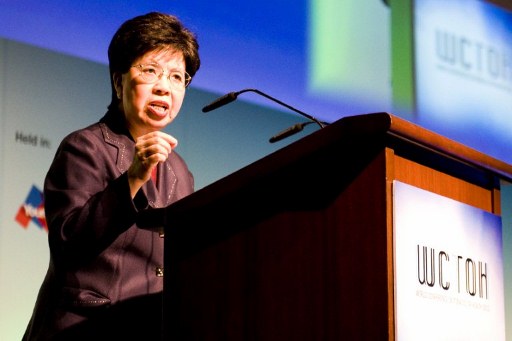SUMMARY
This is AI generated summarization, which may have errors. For context, always refer to the full article.

SINGAPORE – World Health Organisation (WHO) chief Margaret Chan on Tuesday, March 20, denounced the tobacco industry as a “ruthless and devious enemy” and urged governments and civil society groups to unite against cigarette firms.
Speaking at a conference on tobacco and health in Singapore, the WHO director-general slammed cigarette companies for undermining a UN-backed campaign against tobacco use and its associated health risks.
“We have an enemy, a ruthless and devious enemy, to unite us,” she told delegates.
“The enemy, the tobacco industry, has changed its face and its tactics. The wolf is no longer in sheep’s clothing, and its teeth are bared.”
Chan said moves by cigarette firms to challenge the legality of government measures to protect public health amounted to interference in countries’ domestic affairs.
“This is direct interference with a country’s internal affairs. We will not let them do these kinds of tactics,” she said, accusing tabacco companies of using their deep pockets to stymie efforts to curb smoking.
“Big tobacco can afford to hire the best lawyers and PR firms that money can buy. Big money can speak louder than any moral, ethical or public health argument and can trample even the most damning scientific evidence,” she said.
Proposals by cigarette companies to form “joint government-industry committees” to oversee anti-smoking campaigns in some countries were also condemned by Chan.
She said tobacco firms would simply use any such committees “to vet all policy and legislative matters pertaining to tobacco control.”
“Don’t fall into this trap. Doing so is just like appointing a committee of foxes to look after your chickens,” she warned.
Chan, a former Hong Kong health chief who was elected to the WHO’s top post in November 2006, said legal actions filed by tobacco companies against authorities in Uruguay, Norway, Australia and Turkey were designed to weaken their resolve to control tobacco use.
“What the industry wants to see is a domino effect,” she said.
“When one country’s resolve falters under the pressure of costly, drawn-out litigation and threats of billion-dollar settlements, others with similar intentions are likely to topple as well.”
Urging civil society groups to take up the slack when government efforts are weakened due to legal challenges from the tobacco industry she said: “we need this kind of outcry, this kind of rage.”

According to the WHO, tobacco use kills nearly 6 million people each year, including more than 600,000 who are non-smokers but exposed to second-hand smoke.
The UN health watchdog says the annual death toll could rise to more than 8 million by 2030.
In a major victory for the anti-tobacco campaign, the WHO pushed for a global treaty called the Framework Convention on Tobacco Control which came into force 7 years ago.
But a study released Tuesday on the sidelines of the Singapore conference said “interference” by cigarette firms in public health policies is slowing down the campaign against tobacco use.
Many leading cigarette companies say they back greater regulation but warn that too strict actions will force smokers to buy from the black market, which can not be monitored.
On its website Philip Morris says its priority is to conduct research to reduce the risks of smoking-related diseases, while British American Tobacco’s website says plain packaging on cigarettes is “a gift to the black market”. – Agence France-Presse
Add a comment
How does this make you feel?
There are no comments yet. Add your comment to start the conversation.